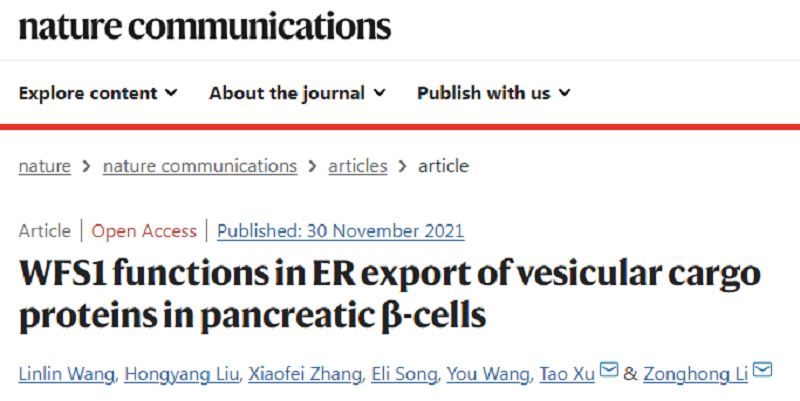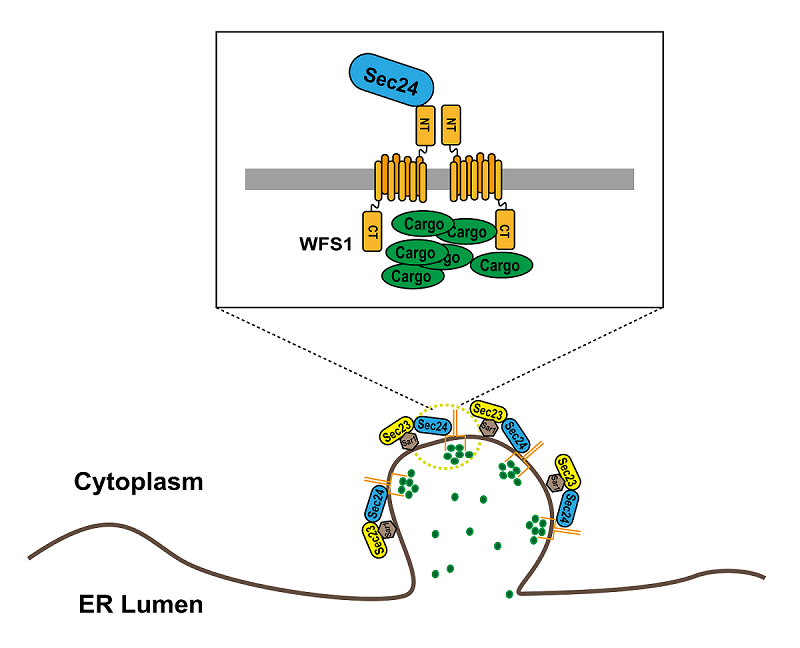WFS1 functions in ER export of vesicular cargo proteins in pancreatic β-cells
Wfs1 gene was identified as a major causative locus for wolfram syndrome, which is a monogenic form of diabetes and neurodegeneration characterized by juvenile diabetes, optic atrophy and deafness. Currently, over 100 rare variants of Wfs1 gene are linked to the juvenile-onset diabetes associated with Wolfram syndrome. In addition, two common variants are strongly associated with type 2 diabetes susceptibility. However, knowledge concerning intensive molecular mechanism of diabetes induced by Wfs1 variants is scanty.

On Nov 30, 2021, a research paper leaded by Prof. XU Tao at the Institute of Biophysics, Chinese Academy of Sciences and Dr. LI Zonghong at the Guangzhou Laboratory, entitled "WFS1 functions in ER export of vesicular cargo proteins in pancreatic β-cells" was published online in Nature Communications. In this study, the researchers demonstrate that WFS1 is a vesicular cargo receptor that transports cargo proteins from endoplasmic reticulum (ER) to Golgi complex in the pancreatic β-cells. Deficiency of WFS1 leads to abnormal accumulation of proinsulin in the ER, thus impedes the proinsulin processing as well as insulin secretion. Mechanistically, WFS1 directly binds to vesicular cargo proteins including proinsulin via its ER luminal C-terminal segment, and its cytosolic N-terminal segment is recognized by COPII subunits SEC24, which is involved in COPII vesicle formation, cargo selection and trafficking to Golgi complex. Pathogenic mutations (E158K and E169K) in the N-terminal segment of WFS1 disrupt its interaction with SEC24, and pathogenic mutations (G695V, P724L, E809K and E830A) in the C-terminal segment disrupt its recognition of cargo proteins. This finding is the first example to identify the vesicular cargo receptor for ER export and indicates the impaired transport of peptide hormones underlies the diabetes resulting from Wfs1 pathogenic mutations.
Prof. XU Tao at the Institute of Biophysics, Chinese Academy of Sciences and Dr. LI Zonghong at the Guangzhou Laboratory are the corresponding authors. Dr. WANG Linlin at the Guangzhou Laboratory is the first author. This work was supported by grants from the National Key Research and Development Program (Grant No. 2016YFA0500203.), the National Natural Science Foundation of China (Grant No. 31730054), and the Strategic Priority Research Program of the Chinese Academy of Sciences (Grant No. XDA12030101, XDA12040104).

A model of WFS1 mediating vesicular cargo protein transport from the ER
Contact: XU Tao
Institute of Biophysics, Chinese Academy of Sciences
Beijing 100101, China
Email: xutao@ibp.ac.cn
(Reported by Dr. XU Tao's group)

